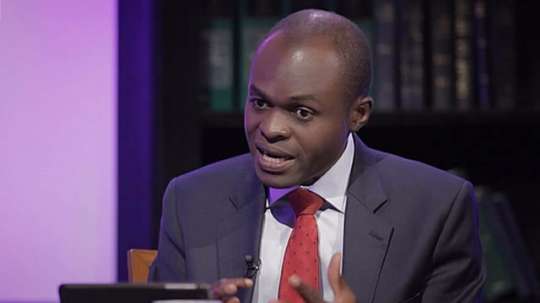
Audio By Carbonatix
Private legal practitioner, Martin Kpebu has described the punishments for not wearing face masks in public under the Executive Instrument 63 as “draconian” for the country and “insensitive” for Ghanaians.
President Nana Akufo-Addo has announced that the Ghana Police Service would be seeing to it that citizens comply with the mandatory wearing of masks law which is stated in the Executive Instrument 63 to help in the fight against the spread of Covid-19.
The E.I. states that a person caught not wearing a face mask is to be punished by the law under the E.I.
They are to pay either a minimum fine between ¢12,000 and ¢50,000 or be imprisoned for a four-year minimum up to 10 years, according to the lawyer.
He told Joy News, that these punishments are insane compared to the rest of the world.
“Under the law when I translate it straight into simple English if a person is caught not wearing one, the minimum fine is ¢12,000. That is, the sentencing for someone who has not worn a mask or the max is ¢50,000 or a minimum of four years imprisonment and up to a total of 10 years,” he explained on the Super Morning Show, Friday.
“This is insane. If you compare around the world you’ll see that we have taken it too far.”
He explained that there is bound to be a culprit found in every society so the country might just be setting itself up for chaos.
“In every society we are bound to have deviants. In the garden of Eden what didn’t happen to Adam and Eve and so we are bound to fall foul of the law.
“In France and other European countries, whilst ours is at the minimum of ¢12,000, there, you pay €135. It’s only on the third committing of the offence that they’ll consider a jail term and it’s nowhere near four years,” he exclaimed.
“Come to Africa, even in South Africa; they also have fines and up to a maximum of 6 months imprisonment. But Ghana, we have taken it to a different level and set our minimum sentence at four years.”
He also explained that the law is inconsiderate of understanding and putting into context the economic and financial status of a majority of Ghanaians who may not be able to pay even the minimum fine.
“When you look at the monetary aspect which is the fines, income levels are low, even university graduates I think are paid ¢750 and the minimum wage is lower.”
“So I don’t expect that on the first commission of the offence the person should be made to pay more than ¢750. Don’t forget many of our citizens are even illiterate and they earn far less. So let’s peg it at the salary of a NABCO employee,” Martin Kpebu said.
He, therefore, appealed to the president to do something about it. “Otherwise it’s just going to be a total mockery and to bring chaos,” he added.
Latest Stories
-
GIPC CEO calls for strategic investment in coconut value chain
6 minutes -
Pink Ladies Cup: Three home-based players named in Black Queens squad
9 minutes -
GES and NIA step up plans for nationwide registration of children
9 minutes -
Heavy politicisation of cocoa industry has affected sector – Professor Peprah
12 minutes -
PBC MD appeals to COCOBOD to end cocoa payment delays
14 minutes -
Pink Ladies Cup: Six debutants named in Black Queens squad for tournament
22 minutes -
Open letter to Education Minister: Rising student deviance and the urgent need for national parental responsibility framework
32 minutes -
President Mahama to deliver State of the Nation Address on February 27
32 minutes -
Dr Kotia backs Ghana’s move to refer maritime boundary dispute with Togo to International arbitration
35 minutes -
When “substantive ” become a security strategy — Rev Ntim Fordjour’s nameplate doctrine
40 minutes -
No plan to pay cocoa farmers, yet ready to change NIB to BNI—Dr Ekua Amoakoh
41 minutes -
COCOBOD is not your cover story. It will not be your scapegoat
42 minutes -
BOST Energies welcomes Salifu Nat Acheampong as new Deputy Managing Director
49 minutes -
NIB or BNI: Will changing the name solve the problem? Asks Prof. Boadi
53 minutes -
Abidjan to host DRIF 2026 as global talks on digital rights and inclusion open for registration
58 minutes

